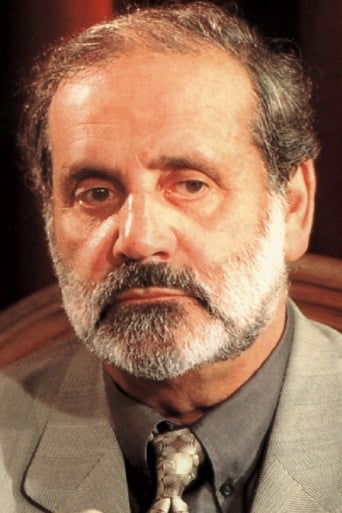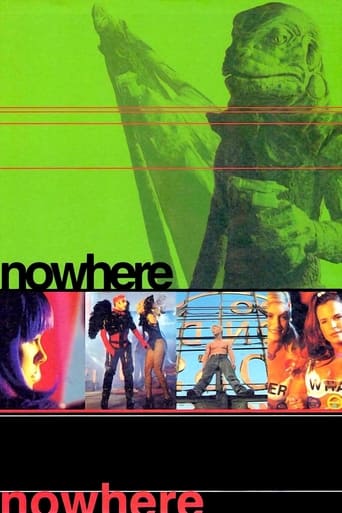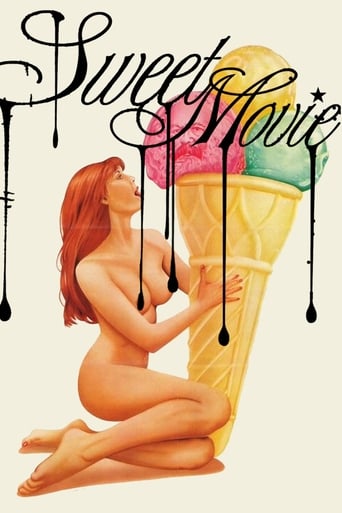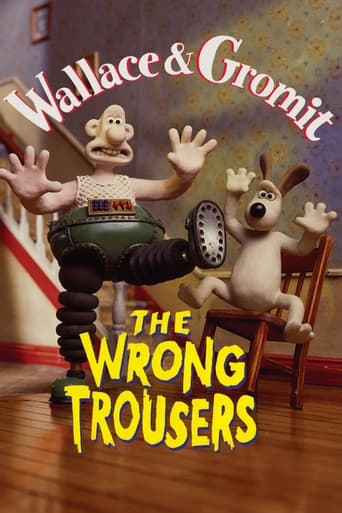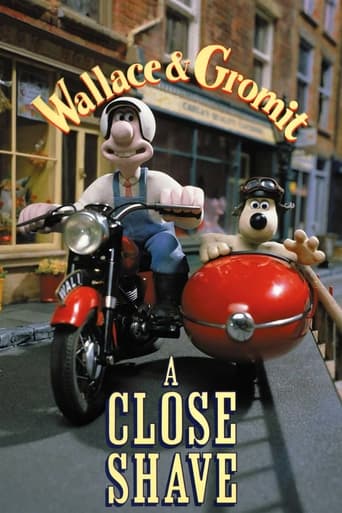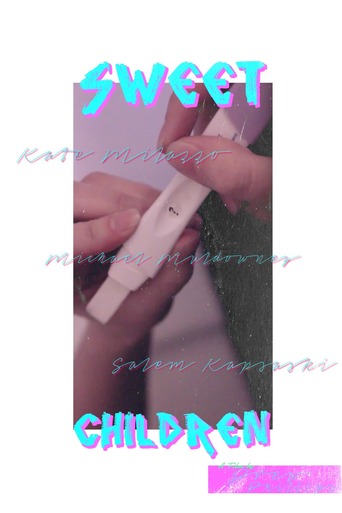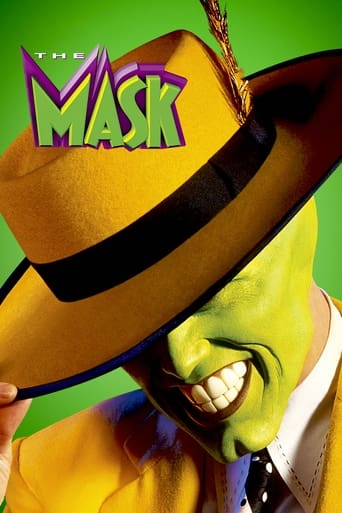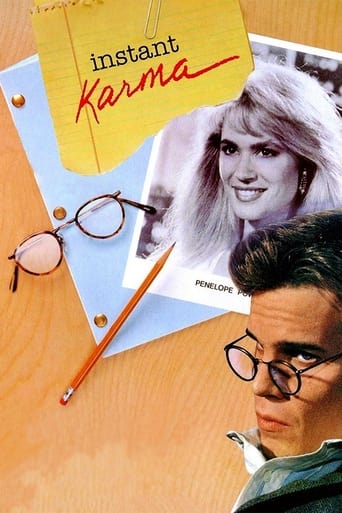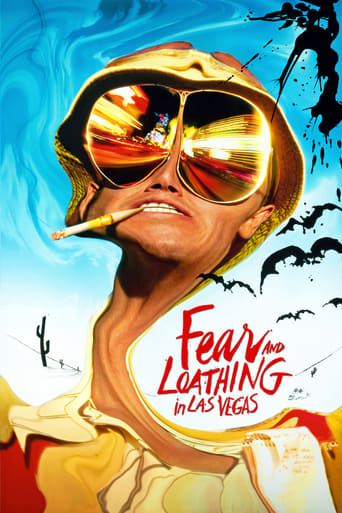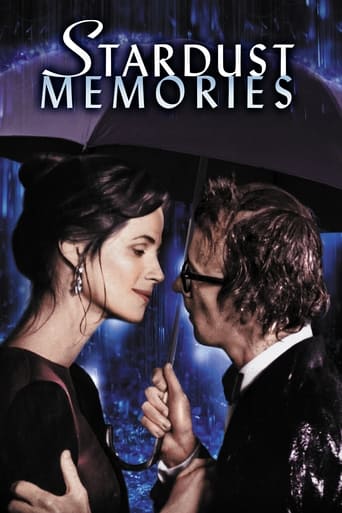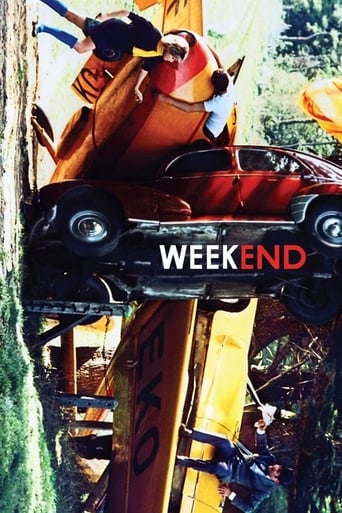
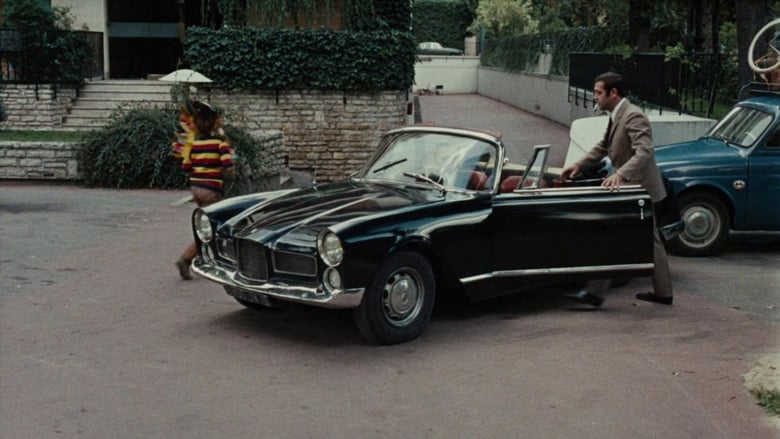
Weekend (1968)
A supposedly idyllic weekend trip to the countryside turns into a never-ending nightmare of traffic jams, revolution, cannibalism and murder as French bourgeois society starts to collapse under the weight of its own consumer preoccupations.
Watch Trailer
Cast


Similar titles
Reviews
Meh. Pretentious as hell. Only interesting bit for me was the drummer's recitation, which was taken from Maldoror. Pathetic attempts to shock with bits taken from Bataille's Story of the Eye. As for the "longest traveling shot in the history of the cinema" and its "bravura technical mastery", as the shot moves along the various cars, you can see the reflection of the film crew moving along on the dolly, in the windows of various cars. I'm sure someone will say Godard did this on purpose. Yeah, sure.
With a film like Weekend firmly secured under his belt, it's truly no wonder why French New Wave filmmaker Jean-Luc Godard has gone on to live in the hearts and minds of cinephiles young and old. Godard predicates himself off of convention-annihilation, otherwise known as destroying silently-accepted norms of filmmaking and with Weekend, it feels as if he held a book of cinematic conventions in his hand and went page-by-page, tearing each page out and proceeding to rip it up with great force.Running with this simile, Godard replaces each ripped-page with a page written all his own - pages that, unlike the predecessors, shatters all preconceived notions and silently-accepted conventions of cinema. The result is his 1967 film Weekend, a film that is one of the hardest pictures I've ever had to review or analyze. I suppose one could go through the film scene-by-scene and meticulously analyze what each one had to offer, but even that may make it difficult to come to conclusion. In my mind, it's best to watch Weekend from a distance and allow it to tamper with your mind and unfold like a violent trainwreck right before your eyes.We follow, through the best and worst of times, a French, bourgeois married couple, Roland (Jean Yanne) and Corinne (Mireille Darc). After a lengthy monologue involving Corinne describe, in great detail, a sexual experience in a way that is equal parts erotic and haunting, so begins their journey to Corinne's parents' countryhouse in order out collect her dying father's inheritance. If worse comes to worse, the couple plans to marry the man in order to collect the money as soon as possible.The trip is a chaotic one to say the least, beautiful in a disturbing way and disturbing in a beautiful way. The couple drive through the countryside of France, witnessing all accounts of shallow human materialism and the pitiful ugliness of western civilization in the form of angry, restless citizens, violent acts committed over relatively trivial occurrences, and several car wrecks and burning vehicles scattered on the side of the road.Arguably the most iconic shot of Godard's entire career is the lengthy tracking shot following a traffic jam for approximately three-hundred meters. The shot lasts about seven minutes and is captured at a small distance from the traffic, and shows the congested right-lane up close while the left lane is vacant and shows Roland and Corinne cruising at a controlled speed while seemingly removing the chaos from their mind.In this shot, like almost every other shot in Weekend, one could determine its meaning in several ways. Too me, Godard seems to be using these two characters' nonchalant and unfazed reactions to a violent traffic jam as a commentary for the desensitization of westerners in the regard that so much tragedy and evil happens at an excelling rate, looking away or just moving along with the tragedy and catastrophic events seems to be the easiest way to go about things. In present day society, things like mass shootings, war, poverty, and other forms of social ugliness have plagued newspapers and TV stations worldwide, so with constant ugliness around us, it's as if looking the other way is what we are best at.Godard's tracking shot brilliantly shows this in a way that some will find excessive and others will find astounding. Godard also uses his trademarks here to further destroy conventional cinema, such as flashing title-cards on screen that may or may not have to do with the subject matter, frequent jump cuts, unsteady shots, and some of the coldest depictions of society I have yet to see. The end of the film shows numerous people and animals slaughtered for what reward? Serviceable food rations and some sort of celebratory ritual amongst a group of anarchists that spout incoherent speeches about what appears to be a cross between appreciation for the land as well as control over it? It's dark and often hard to watch.With that being said, to call Weekend a tough sit for one-hundred and four minutes is almost an understatement. I emerge with the same remarks I had about Godard's directorial debut Breathless in that I had more fun writing the review and talking about the film than I did actually enduring it. With his frequent interjection of title cards, jump cuts, overlapping and fading sound mixing, among many other unconventional tactics, it's as if Godard, in the wake of creating one of France's most provocative and daring films, is also trying to create one of the country's most unwatchable pictures in history. If the subject matter wasn't enough, you have a presentation equal to a waiter spilling hot soup on your lap at a diner - it's a disruption to what you expect and it's thoroughly uncomfortable.But that's what you get with Weekend and what you take away from the film Godard doesn't seem to mind much. Whether you see it as a critique of bourgeois society, a magnifying glass on the hellish state of blue collar society, how bourgeois society views the lower classes, or a depiction of the disgusting materialism of western culture (or a combination of the aforementioned ingredients like myself), it would appear that Godard doesn't mind what you find in it. Thinking about it at great length, I'm almost certain he doesn't care if you watch it to begin with or emerge with something to contemplate. In a way, that would be the same kind of selfishness that Godard seems to be condemning in this picture. Who says what you have to take away and how you have to take it?
Since many years my brain has been infested with political bacteria - or maybe they are bacilli. It is definitely something with bac. Anyway, many of Godard films deal with the political inclinations of common people like us. So Jean-Luc Godard is truly a film director, who appeals to my political fascination. Another hallmark of Godard is his total inability to connect with his main characters. He doesn't feel empathy, and doesn't transfer any emotions to the audience. He just hovers around, and looks down from the skies. I suspect that his attitude derives from Sartres existentialism, but who am I? Godard loves to break established rules and do what God forbids. The camera is present, and records the events, but often it just seems to wander around. Or it records long monologues. The characters tend to suffer from moments of insanity. Even though death and derailment are omnipresent in Godards films, his lordly contempt for logic confronts each character with many bizarre and hilarious moments. Thus the pertinent person and his situation continuously goad the viewer into bursts of laughter, or maybe just chuckling (I don't know you, so I should be modest). It is amazing. La Nouvelle Vague, the Godard style emerged as a rebellion against the authoritarian rule of the presidential regime. Of course here I mean De Gaulle, not Obama. OK, it's a review of Weekend. Well, in the French version Weekend is incomprehensible (don't even try!), but fortunately Amazon is kind enough to offer a version with English subtitles. Amazon is amazing - but you got that already. Nevertheless, with Weekend the subtitles don't help. Godard depicts a world of science fiction, where cars seem to dominate life. As far as one can see along the road, there are shattered and gutted cars, with the dead corpses of the occupants dispersed around. It is creepy, they look like godforsaken. I told you, that in all his films G. is addicted to playing with dead persons. I prefer emotions. However I do enjoy in this film the wide variety of cars, though. For they stem from the late fifties and sixties, when I was a toddler. Children love cars. Their design was so characteristic, and I recognized many of these old models: the Citroens, Peugeots, Fiats, Volkswagens, Opels, Fords, Toyotas and Hondas. I even saw that witty little Simca again, looking somewhat like a bowler hat with wheels. These days the make of Simca doesn't exist any more, you know. Sometimes I miss it. Also it was the time when cars really became available to the working class. Owning an automobile became the symbol of emancipation. At the end of the film we enter a camp of guerrilla, in France of all places! And they are just a single platoon, I believe of Cleres-Bacqueville (but check me!), suggesting that apparently they are everywhere. They form a dedicated band of believers, that tries to gain power, and arrests passing infidels. Undoubtedly Godard has a message with these moments, and it sure looks amazing. There must be some deeper layer here, that has escaped my attention. IMDb guys: help! I am afraid that somewhere on the way he has lost me. Humbly I admit my superficiality. In summary: I like Masculin Feminin (youngsters becoming adults), La Chinoise (city guerrilla, but just kids, with many witty moments) and Tout va bien (a hilarious labour conflict) better. Check them here on IMDb, you find some excellent (dare I say amazing?) reviews there! If you like to see that good old Simca once again, though, then Weekend is the film for you.
Despite having a cleverly conceived and infamous 8 minute continuous take of the traffic jam from hell, I simply find this film nasty.There is no humour to lift the macabre hell and whilst it might have been dreamt up in a hallucinogenic haze, when this was fashionable, this doesn't relate to me. I get the slant on the misplaced morals in a modern society (a woman escaping from a burning car is only concerned for her designer handbag, not her passengers' well-being). It then just gets weirder and weirder, interspersed by shrill lunacy.As you can guess, I've never got into J L Godard. I love with passion almost all French, Italian and other world cinema, with Felinni and Bergman, both considered a bit balmy and self-centred, as favourites.It was only through esteemed Film Guides and other reviews that praised this film to the heights that I ever considered buying it. It's relative rarity and controversy are the only reasons to hang onto it.



